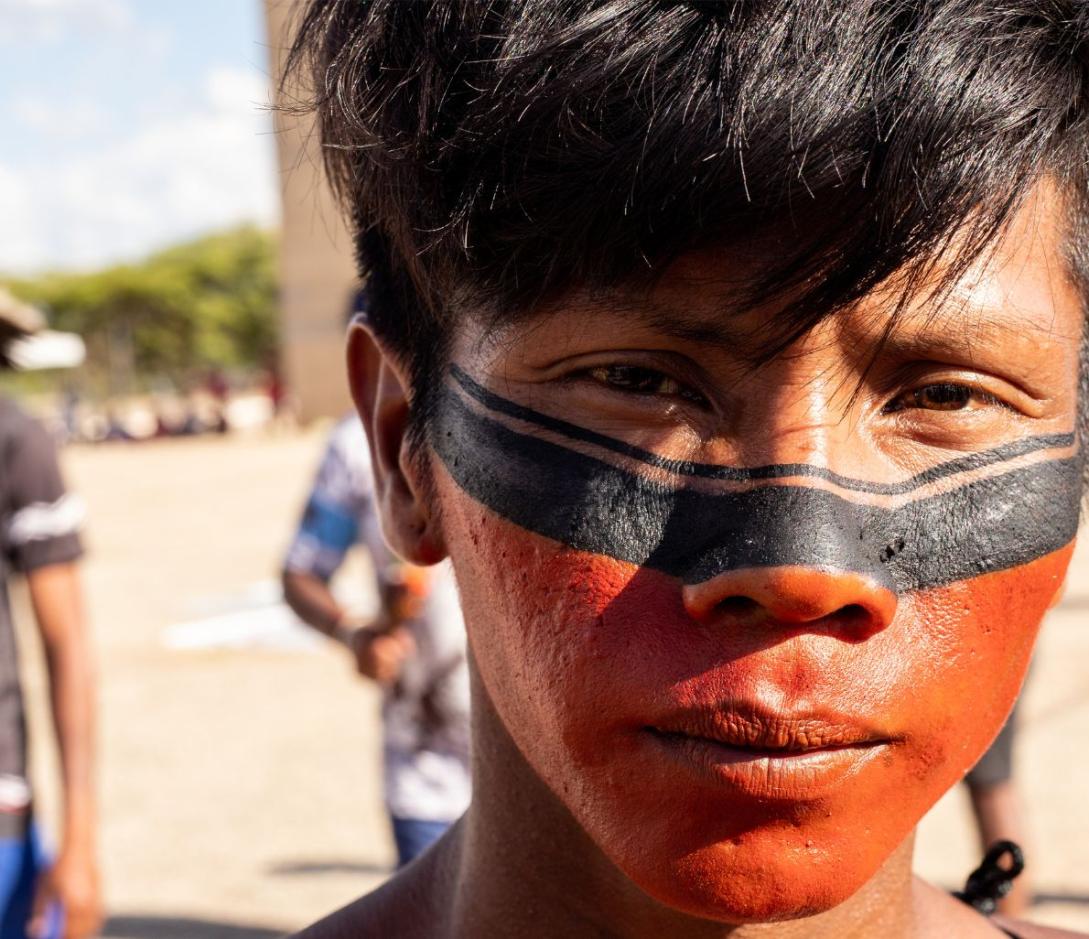Indigenous Youth speak up: “Nothing for us without us”

At the United Nations Climate Change Conference (COP27) in 2022, a leading voice among Brazil’s Indigenous youth, Samela Sateré Mawé, shared a powerful message with the world.
"Nothing for us without us!"
The message is crystal-clear: Indigenous youth demand a voice in tackling environmental issues and shaping decisions that impact them.
Unique skills and knowledge
“Indigenous Peoples are an extension of nature, and nature is an extension of us.”
says Samela Sateré Mawé, a graduate in biology from Amazonas State University.
Her activism is grounded in the belief that Indigenous People are the best guardians of the Amazonian rainforest as they depend on its biodiversity to survive.
Samela’s roots in Amazonian indigenous culture inspire her fight for the environment and the rainforest, threatened as it is by illegal loggers, encroaching farmland and wildcat gold miners. The name of Samela’s people comes from the Tupi language. The word Sateré means “lizard of fire” - in reference to a dominant clan within the tribe. Mawé is a word meaning “smart and curious parrot”. The Sateré-Mawé are forest people who inhabited ancestral homelands near the headwaters of Amazonian tributaries. Encroachment on the forests and spreading diseases have driven hundreds of the 13 350 Sateré-Mawé to move to urban areas, as Samela’s parents did before she was born.
The new generation of Indigenous advocates are harnessing the power of social media to share their knowledge and voice their rights. Samela joined the #OurVoiceOurFuture campaign initiated by the Diplomatic Service of the European Union in 2022. Today, the youth-led social media campaign has become a global platform, reachingover 76 million people. #OurVoiceOurFuture fosters solidarity among youths through inspiring stories. Samela highlights critical issues affecting Indigenous Peoples. Listen to her voice:
https://www.instagram.com/reel/CjJRmklDCqa/?utm_source=ig_web_copy_link&igshid=MzRlODBiNWFlZA==
Intergenerational connections
Samela hails from a strong lineage of powerful women, with deep roots in the battle for the rainforest and Indigenous communities. Her grandmother was the visionary behind the establishment of the Associação de Mulheres Indígenas Sateré Mawé, an organisation that works to strengthen the rights of indigenous peoples. It supports and empowers women to protect their lands and their social, cultural and economic well-being.
“Being born into the Sateré Mawé Indigenous Women’s Association, I have always experienced what it is to be part of the struggle,” says Samela proudly. “The sense of the collective, the meetings, the demonstrations, the protests. Listening to the words spoken by my grandmother and my mother, as well as other women in the Indigenous movement. All of this has been essential in shaping me as a woman, as an activist and as an Amazonian.”
Samela is vocal about the need for the greater presence and visibility of indigenous women in political spaces. A fervent advocate for women’s empowerment in what still is a patriarchal community, she argues that indigenous women’s strengths and generational knowledge make them vital protagonists in advancing the movement.
"In the past, it was only the men who left their villages and their territory to go and talk about the issues concerning Indigenous peoples, such as health care, education, the demarcation of Indigenous territories. But when Indigenous women raise their voices, we feel more represented as part of the Indigenous movement’s struggle.”
European Union’s commitment to indigenous issues
The EU is committed to the UN Declaration of the Rights of Indigenous Peoples and actively promotes the involvement of indigenous leaders and human rights defenders in global decision-making processes and development initiatives.
With an investment of 2.3 M EUR, the Arctic Youth Dialogues initiative is an example of the EU’s commitment in this respect. Aligned with the EU's Arctic Policy and the Youth Action Plan in EU external relations, the project focuses on engaging Arctic and European youth, including indigenous youth, in critical policy and decision-making processes.
The EU Arctic Forum and Indigenous Peoples’ Dialogue in Nuuk, Greenland took place on 8-9 February 2023. It offered a platform for discussion on Arctic matters affecting Indigenous Peoples. Niskua, a Kuna from Panama and a Sámi from the Swedish side of Sápmi, stresses the importance of being part of decision-making in all matters that affect Indigenous Peoples. Watch the video below.
https://www.instagram.com/reel/CocvC37Nuuk/?igshid=MzRlODBiNWFlZA%3D%3D
Follow the link to learn more about the International Day of the World's Indigenous Peoples 2023.





